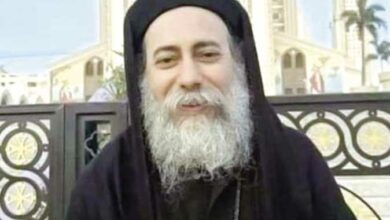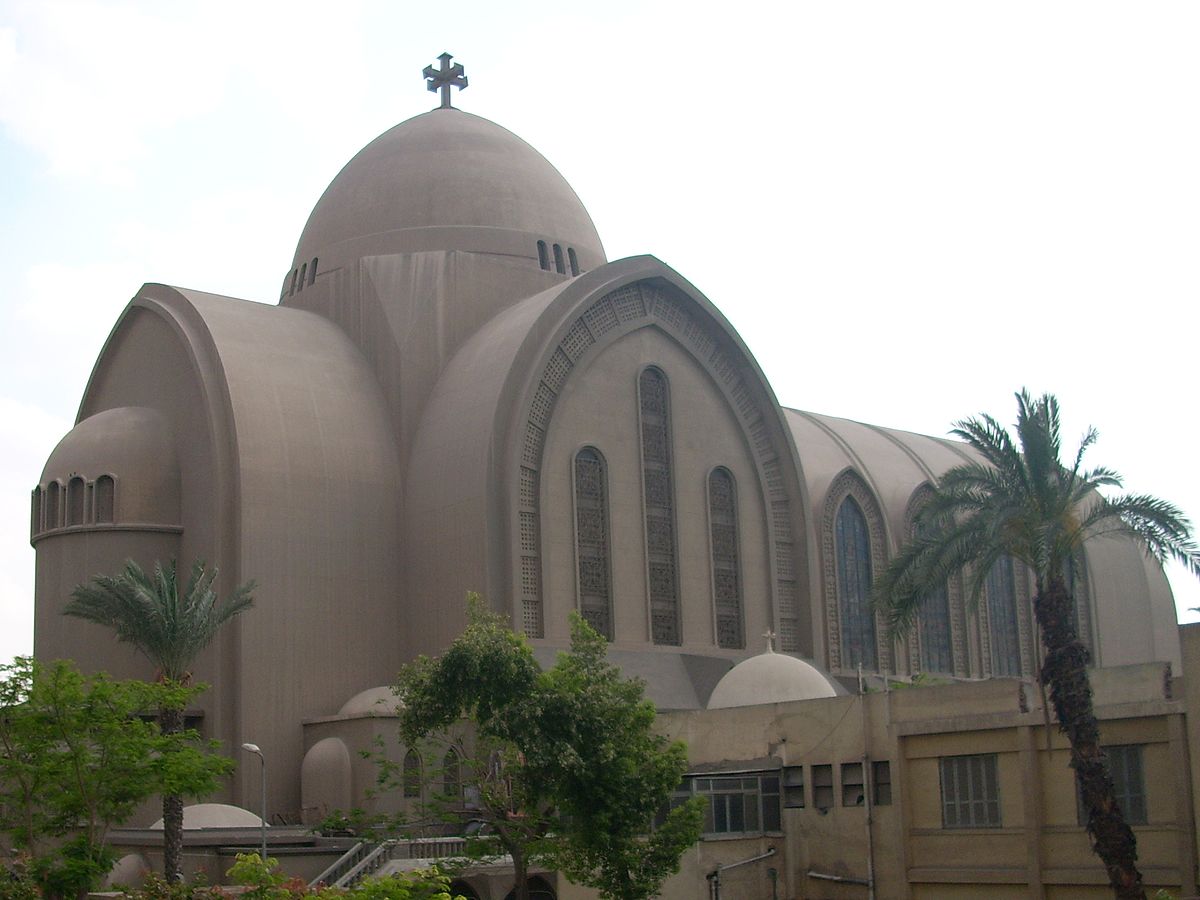The Coptic Orthodox Church elections Monday whittled the list of candidates for the church’s papacy down from five to three.
The names of the three remaining candidates will be written on slips of paper and presented to a blindfolded young Coptic boy, who will pick out one name. The winner of this “altar lottery,” slated for 4 November, will be the next pope.
However, before the elections even began, the Papal Nominations Committee had already selected a relatively homogenous, five-member shortlist from a more politically diverse field of 17 candidates.
The electoral stage therefore engendered little impassioned debate. All the available candidates appear to represent a distancing of the church from the relatively politicized role that had been adopted by the late Pope Shenouda III.
“The difference was in the extent to which voters had heard of them,” says Mounir Fakhry Abdel Nour, a voter and former tourism minister. “The three candidates who have been selected are the most well-known. Bishop Raphael, who received the highest number of votes, is the bishop of the central Cairo churches.”
The three winners of the election were Bishop Raphael (1,980 votes), Bishop Tawadros (1,623 votes) and Father Raphael Ava Mina (1,530 votes). Father Seraphim al-Suriani and Father Pachomius al-Suriani got the fewest votes and were disqualified.
None of the three remaining candidates have a large public profile.
Bishop Raphael, 54, auxiliary bishop of central Cairo, graduated from the faculty of medicine and worked as a surgeon before becoming a priest in the early 1990s. He is known for maintaining good relations with young Copts. He is the best known of the three.
Bishop Tawadros, 60, the auxiliary bishop for the northern Beheira governorate, and auxiliary to Bishop Pachomios (who is currently serving as acting pope), studied pharmacy at Alexandria University and is known to have good relations with Islamists.
Father Raphael Ava Mina, 70, a monk at St. Mina Monastery, was the deacon for Father Kyrillos VI. He wrote several religious books.
Georgette Kellini, a member of the Papal Nominations Committee, which selected the five candidates to enter Monday’s vote, says the committee considered “the Holy Bible and the 1957 bylaw, the resume of every candidate and his sermons, writings, plus the letters that were sent to the committee from the Coptic people.”
The Papal Nominations Committee, which consists of nine bishops and nine lay Copts, is appointed by the Holy Synod, which is itself composed of all Coptic bishops.
“We also conducted interviews with the candidates who were not well-known to us. If the street didn’t support the new pope, there would be a big problem,” says Kellini.
Kellini refused to discuss the issues which arose from the letters, sermons and writings. But interviews with Copts who were able to vote in Monday’s polls suggest that there is a strong consensus that the new pope should leave politics to lay Copts, and that the low-profile, quietist profile of the candidates chosen reflects that demand.
The exclusion of controversial bishops such as Father Bishoy, secretary of the Holy Synod, and Father Youanis, former secretary for Shenouda, was a relief for some. Some Coptic activists had filed challenges with the Supreme Administrative Court to stop the elections, but withdrew their challenges when these controversial candidates were excluded.
Depoliticization
Egypt Independent took a straw poll of 30 voters, including 10 clergy and 20 others. Twenty-two said they wanted their pope to be a spiritual leader who has a general understanding of politics without getting immersed in them.
Another five said they want him to be an apolitical spiritual leader, while three said they want him to offer both spiritual and political leadership.
Youssef Sidhom, editor-in-chief of Watany, a Coptic newspaper, is of the first mindset.
“The pope should not intervene in politics because Copts should engage in politics and express themselves through mingling with Muslims, while church representation of Copts hampers this,” he says. “The pope’s intervention in politics will serve the religious state that the Islamists want.”
Copts, who constitute roughly 10 percent of the population, are generally wary of Islamists’ rise to power.
The tendency toward an apolitical pope represents a reaction to the legacy of Pope Shenouda III, whose rule roughly coincided with that of presidents Anwar Sadat and Hosni Mubarak.
Copts underwent difficult times with Shenouda as pope. Copts suffered from political marginalization since the military rose to power in July 1952.
Egypt witnessed many incidents of sectarianism, which peaked under Mubarak with the New Year’s Eve explosion at Two Saints Church in Alexandria, where 27 Copts were killed. Many Copts blamed the state for failing to protect them or even colluding in the attack itself.
Shenouda, often perceived as having been close to Mubarak, was not able to offer a response to angry Copts.
After the blast, Copts disobeyed their pope for the first time, refusing to heed his call to stop protests. For three consecutive days, Copts protested in seven governorates across Egypt, three weeks before the outbreak of the 25 January revolution.
Kamal Zakher Moussa, coordinator of the Secular Copts Current, says, “I do not harbor fears that the pope will once again have a political role. On 25 January, an end was put to that when the young Copts sought a role outside the church.”
Meanwhile, Boutros Samaan, archibishop of Beheira, asserts that, “God chooses the right person for the right time.”
“Pope Shenouda was not fit for the time of Pope Kyrillos and Kyrillos was not fit for Shenouda’s time,” says Samaan. “The pope should have an opinion in politics and engage in politics as an Egyptian citizen. And as a son of the church, he should be a spiritual leader.”
Yet Emad Gad, a former MP and analyst at Al-Ahram Center for Political and Strategic Studies, thinks the new pope will be forced to take a political role, whether he likes it or not.
“The existing problems will force him into politics,” Gad says. “We have a president from the Muslim Brotherhood and sectarian assaults. It is a very difficult period.”
Rule
Of the millions of Copts in Egypt, just 2,417 were eligible to participate in the papal election, 2,256 of whom cast votes.
The voters include religious figures and “notable” members of the lay congregation, including Coptic members of the Journalists Syndicate. They must be more than 35 years old, hold a university degree and earn more than LE400 per month, among other qualifications.
The criteria have attracted criticism for perceived elitism, excluding the vast majority of Copts.
“These laws are elitist and discriminate against the poor,” activist Vivian Fouad told Egypt Independent last month.
Fouad says she thinks all Copts ought to get a vote; others think the net should be cast somewhat wider among professional Copts. Some also object to the fact that some bishops were allowed to nominate themselves for the process.
Moussa, of the group Secular Copts, proposes that in the future, bishops should not be eligible.
Historically, in most papal elections bishops have not been eligible, as part of a mechanism to discourage personal ambition and politicking.
The 30 Coptic voters in Egypt Independent’s straw poll all agreed that the rules for future papal elections ought to be changed, although there is not necessarily agreement on what those changes ought to be.
Translated from Arabic by Dina Zafer.
This piece appears in Egypt Independent's weekly print edition.




